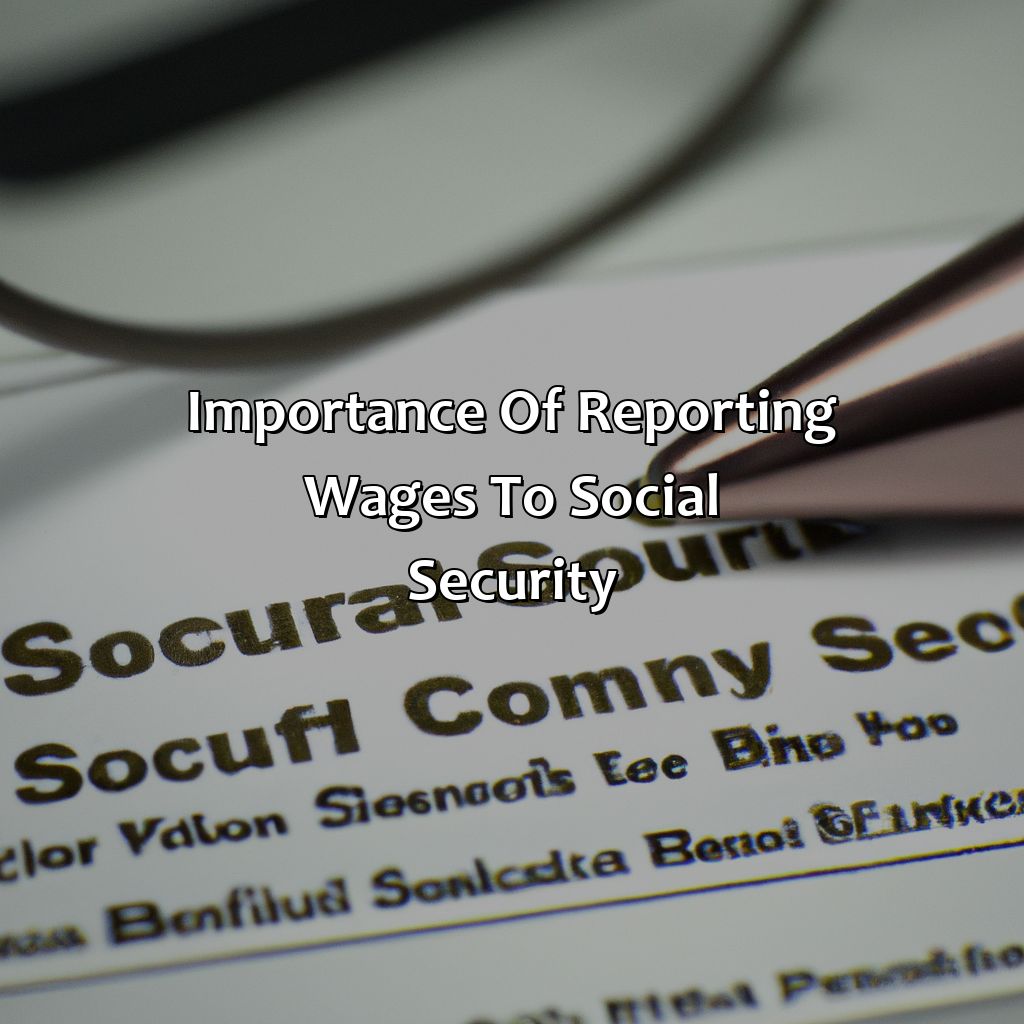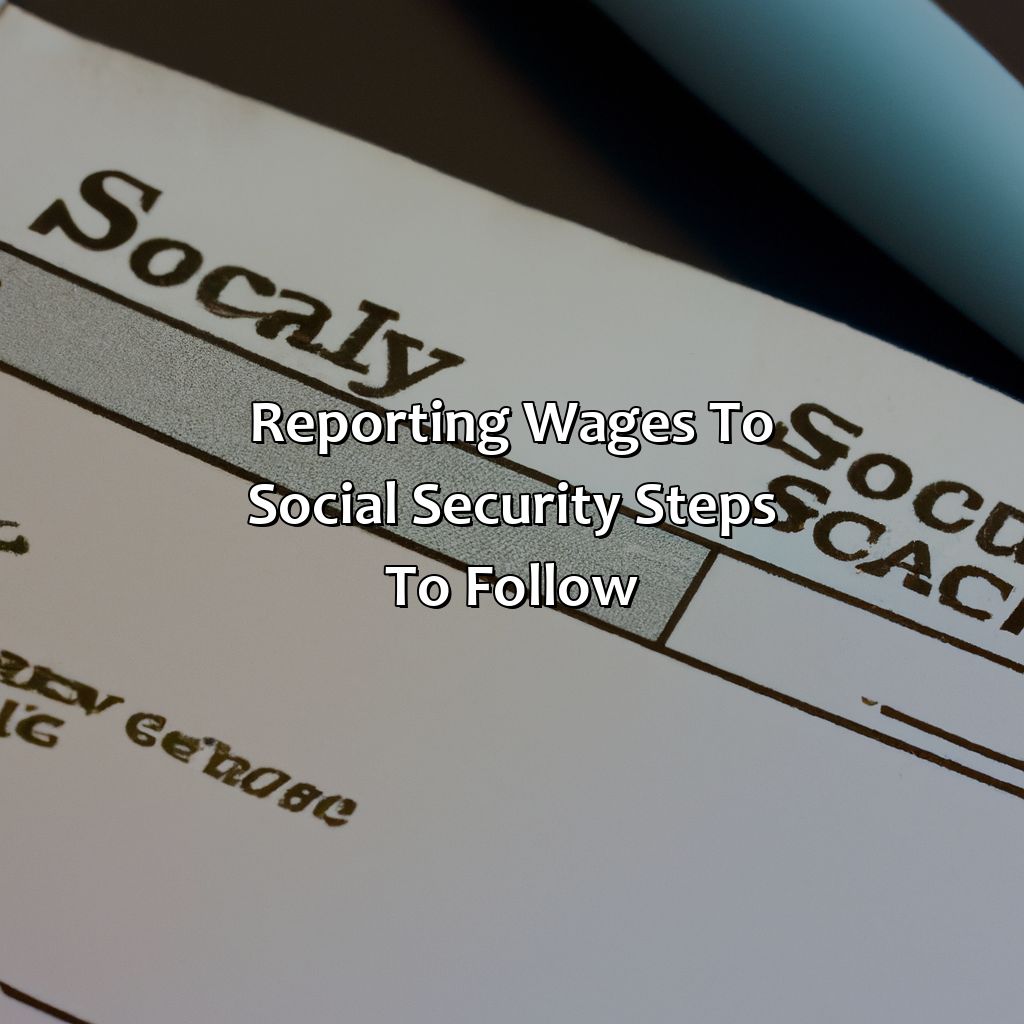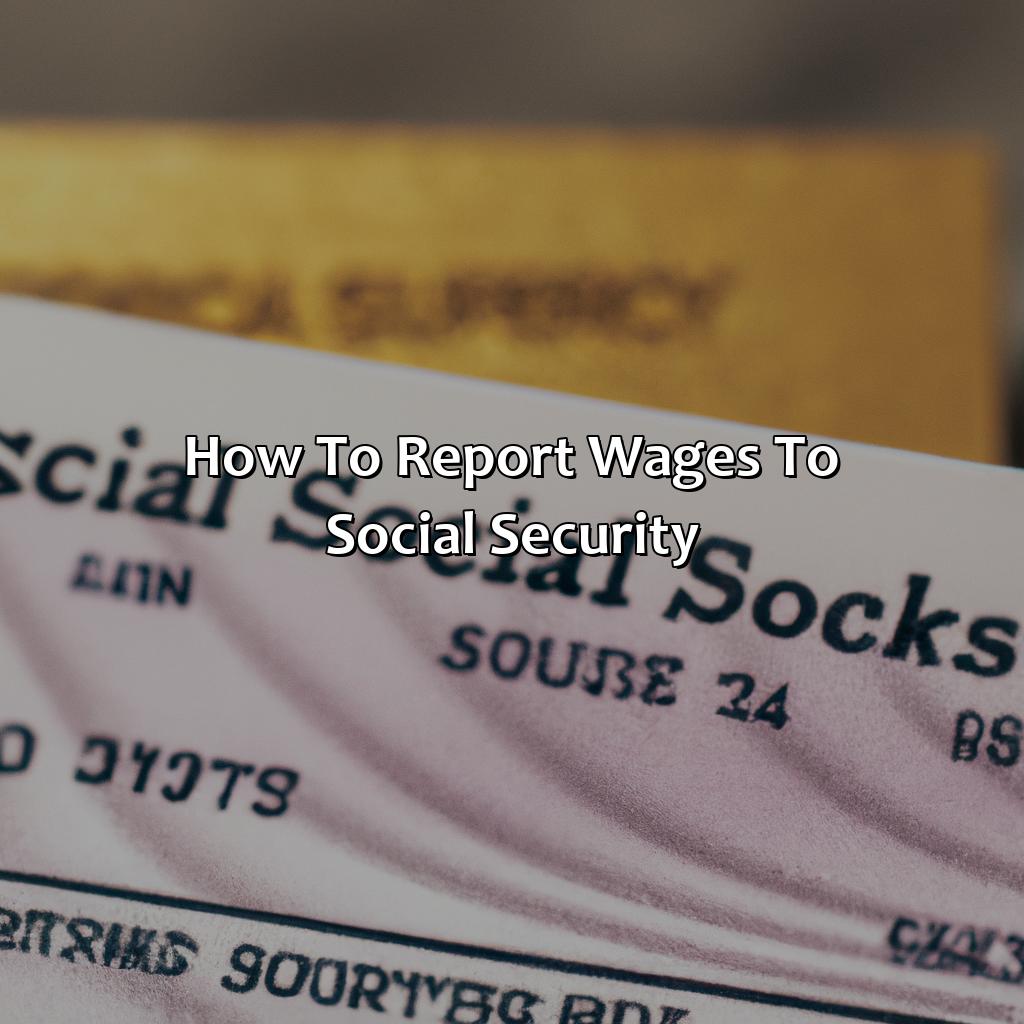How To Report Wages To Social Security?
Key Takeaway:
- Reporting wages to Social Security is important in order to ensure accurate Social Security benefits and avoid possible penalties or fines for underreporting or failing to report income.
- The steps to report wages to Social Security include creating a my Social Security account, accessing the Earnings Record on my Social Security, checking the record for accuracy, and correcting any errors if necessary. It is also important to report any additional income earned throughout the year.
- The deadlines for reporting wages to Social Security are April 15th for self-employed individuals and January 31st for employers. It is important to meet these deadlines to avoid penalties and ensure accurate reporting.
Have you ever wondered how to report wages to social security? You are not alone in this dilemma. This article will provide an explanation on the reporting process and the options available to ensure accurate reporting. Read on for more information.
Importance of Reporting Wages to Social Security
Social Security reporting of wages is crucial for various reasons. Accurate reporting is essential to ensure that individuals receive the correct amount of benefits and that employers maintain proper records. It is necessary to abide by Social Security Administration (SSA) guidelines and provide the necessary information about earnings, taxes paid, and retirement contributions. Failure to report wages accurately or at all can result in penalties and loss of benefits for individuals.
In addition to ensuring that individuals receive the correct amount of benefits, Social Security reporting also plays a significant role in the economy. Wages reported correctly contribute to the Federal Insurance Contributions Act (FICA) tax, which funds the Social Security program. This revenue ensures that the program is sustainable and continues to provide benefits to individuals who require them.
It is essential to report wages to SSA annually, even if an individual is not currently receiving benefits. This is because future benefits are calculated based on reported wages and earnings history. Keeping accurate records can also serve as a useful tool for individuals to plan for retirement and make informed financial decisions.
To ensure accurate wages reporting, it is recommended to review paycheck stubs regularly and report any errors to employers promptly. Additionally, individuals should report all earnings, including tips and self-employment income, to SSA. Failure to report these earnings can result in penalties and affect the accuracy of future benefit calculations.

Image credits: retiregenz.com by Yuval Duncun
Reporting Wages to Social Security: Steps to Follow
To report your wages to Social Security accurately and effortlessly, follow these steps:
- Create a my Social Security Account for easy access to your earnings record.
- Then, check it for accuracy.
- If any errors are found, discover how to fix them.
- Finally, learn how to report extra income to Social Security.

Image credits: retiregenz.com by James Washington
Create a my Social Security Account
To access your Social Security account online, you need to go through a process to set up a personal account. This is how to establish your ‘my Social Security Account.’
To create a ‘my Social Security Account,’ follow these six simple steps:
- Visit the official website of the Social Security Administration.
- Click on the ‘Sign in or Create an Account’ button on the homepage.
- Follow the instructions and provide required information for identity verification.
- Create a username and password (make it strong) – enter security questions and answers.
- Read and accept the terms of service agreement upon reviewing it carefully.
- You are ready to use your ‘my Social Security Account.’
One essential function that you can perform on your ‘my Social Security Account’ is reporting wages earned through work activity quickly.
It is common knowledge that reporting earnings accurately and on time is crucial, especially in calculating social security benefits. A story shared by an elderly woman can attest to this importance. She expressed her worrying ordeal about inaccurate earnings recording at first, which she believed caused her to get lower social security. However, after detecting it early enough through her account, she was able to correct several years’ worth of mistakes and significantly increase her benefits.
Just when you thought stalking yourself on social media was enough, now you can also stalk your earnings record on my Social Security.
Access the Earnings Record on my Social Security
The process of accessing your earnings record on the Social Security website entails a few straightforward steps.
- Log in to your account, then click on the ‘Earnings’ tab to view your annual income history.
Once you access your earnings record on the Social Security site, you can review any mistakes or omissions that could impact future benefit payments. Also, ensure that the reported amount matches what you actually earned since discrepancies could affect future benefits.
It’s crucial to remember that every year, Social Security generates a statement of estimated benefits based on your work history and reported earnings. Therefore, it’s paramount to review these details regularly and report discrepancies early enough in time for correction while still being eligible.
One beneficiary realized there was an error in her earning statements after noticing reduced benefit estimates than she anticipated. She quickly reviewed her earnings statement with the Social Security Administration and resolved a reporting error from six years before which significantly impacted her benefit payouts in future years. This story highlights what could happen by ignoring checking reports and verifying errors consistently.
Trust but verify: double-checking your earnings record is like reviewing your ex’s social media – it may reveal some unpleasant surprises.
Check Earnings Record for Accuracy
Ensuring Accuracy of Reported Earnings
To protect your Social Security Benefits, it is essential to confirm that your earnings record is accurate. Incorrect information can lead to over or underpayment of benefits. Here’s how you can ensure the accuracy of your reported earnings.
- Review Your Social Security Statement: Your statement contains a detailed record of all the income and social security tax you have paid throughout your working life. Every year, SSA sends out these statements three months before the account holder’s birthday month.
- Check W-2 and Tax Returns: Double-check that your income records match the numbers on employer-provided documents such as W-2 and tax returns.
- Notify SSA about Disagreements: If you find any discrepancies or wrong entries, report them immediately to Social Security Administration (SSA).
- Confirm With Employers: In case there are errors in the employer’s reported wage data, communicate with them about correction procedures.
Apart from checking yourself, it’s good for employees to confirm their employers that they’ve accurately filed their taxes correctly every year before handing in critical documents.
Reporting wages to Social Security undoubtedly plays an integral part in determining future benefits, but most beneficiaries aren’t entirely aware of its importance until it affects them directly. The accuracy of one’s earnings record is non-negotiable, so make sure to check for mistakes every few years, especially when nearing retirement age.
Fixing mistakes on your earnings record is like trying to fix a typo on a billboard – it’s a big job, but it’s gotta be done.
Correcting Errors on Earnings Record
Correcting Mistakes on Earnings Record: An Expert Guide
If mistakes occur on your earnings record, don’t worry. You can easily correct them by following the steps below.
- Step 1: Review Your Earnings Statements
Check and match your earnings statements with your personal records. If there are any inconsistencies, make sure you collect valid proof. - Step 2: Download and Print Out Form SSA-7004
This is the form you need to fill out and mail to the nearest Social Security Administration office. - Step 3: Provide Accurate Information
Complete all sections accurately, ensuring that they match the corrected data. Ensure that you also include supporting evidence of corrections made if needed. - Step 4: Send in Form SSA-7004 and Supporting Evidence
Your application must be mailed to your local social security administration office along with relevant documents for verification - Step 5: Verify Changes Made
You will receive a letter acknowledging receipt of form SSA-7004 showing changes made after verifying the received evidence submitted with it.
Note that most errors found in an earnings statement are usually arithmetic errors, missing, or incomplete information on wages. You must take immediate action when such errors arise to avoid incorrect benefit payments over the retirement phase planned.
Don’t wait until you start receiving benefits or nearing the retirement age as it becomes more difficult once this happens.
Correcting mistakes on Earnings Records should always be a priority to avoid problems in getting future benefits and ensure that payout rates are accurately calculated.
Adding to your income is like adding to your problems, but at least reporting it to Social Security is easy.
Reporting Additional Income to Social Security
Reporting Income to Social Security: Ensure your income is reported accurately to receive appropriate benefits. Follow the process provided by the Social Security Administration and report all additional or self-employment income. Failure to do so may result in penalties and incorrect benefit amounts.
To report additional or self-employment income, use Form SSA-7162. Additionally, inform the Social Security Administration of any changes in employment or wages. You must report accurate and timely earnings information for all jobs when requested.
It is vital to keep track of earnings through pay stubs or record of financial transactions for proper reporting. Failure to report additional income can result in a surprise tax bill at year-end, as well as an interest and penalty charge from the IRS.
According to a Forbes article, “Social Security benefits are based on lifetime earnings,” making it essential for everyone to ensure their wage reporting is correct and complete.
Reporting your wages before the deadline is like a race against time, but with less running and more paperwork.
Deadlines for Reporting Wages to Social Security
Social Security Wages Reporting Deadlines: Learn the important deadlines for reporting wages to Social Security in a timely manner to avoid penalties.
Important Deadlines for Reporting Wages to Social Security:
| Reporting Year | Deadline |
| 2020 | January 31, 2021 |
| 2021 | January 31, 2022 |
| 2022 | January 31, 2023 |
Late Reporting Penalties: Not reporting wages to Social Security by the deadlines mentioned earlier could result in late reporting penalties. It’s important to report on time to avoid penalties.
Don’t miss out on reporting your wages on time! Ensure you report your wages to Social Security by their respective deadlines to avoid late reporting penalties. Missing the deadlines could result in unnecessary fines and delayed benefits. Act now to stay on top of your reporting obligations.

Image credits: retiregenz.com by Adam Woodhock
Some Facts About How To Report Wages To Social Security:
- ✅ You must report your wages to Social Security if you work and receive disability or retirement benefits. (Source: Social Security Administration)
- ✅ Social Security requires that you report your earnings for each month in which you worked, regardless of when you receive payment. (Source: AARP)
- ✅ Your wages can be reported online using your mySocialSecurity account or by calling the toll-free number. (Source: Social Security Administration)
- ✅ Social Security uses your reported wages to calculate your benefits and ensure that you are receiving the correct amount. (Source: Social Security Administration)
- ✅ Failure to report your wages to Social Security can result in overpayments, underpayments, or even loss of benefits. (Source: Social Security Administration)
FAQs about How To Report Wages To Social Security?
How do I report wages to social security?
Reporting wages to social security is easy. You can either report your wages yourself using your online social security account, or your employer can submit a wage report to the Social Security Administration (SSA) on your behalf.
What if I forget to report my wages to social security?
If you forget to report your wages to social security, you should contact the SSA as soon as possible to correct the error. If your earnings are not reported, you may not receive full credit for the work you have done, which can affect your future Social Security benefits.
What happens if my employer does not report my wages to social security?
If your employer does not report your wages to social security, you should contact the SSA immediately. Your employer may be subject to penalties for failing to comply with the reporting requirements.
How often do I need to report my wages to social security?
Your employer is required to submit a wage report to Social Security annually. However, you can also report your earnings yourself using your online social security account.
What information do I need to report my wages to social security?
You will need your Social Security number, your employer’s name and address, and information about your wages, such as the total amount earned and any taxes withheld.
What if I have multiple jobs or sources of income?
If you have multiple jobs or sources of income, you will need to report the wages earned from each employer or source separately. You can do this yourself using your online social security account, or your employers can submit wage reports to the SSA on your behalf.
